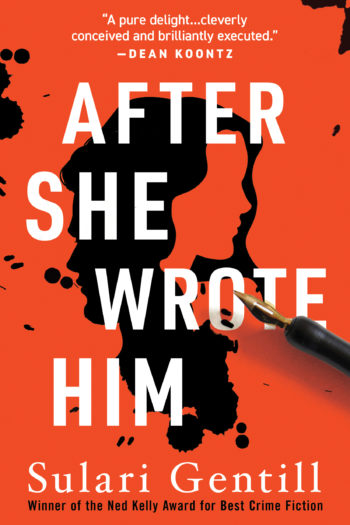 Sulari Gentill’s latest novel, AFTER SHE WROTE HIM (originally published in 2017 as CROSSING THE LINES), is a captivating thriller that Dean Koontz calls "pure delight, a swift yet psychologically complex read." To celebrate its rerelease, Sulari was kind enough to write a piece for us about the significance of To-Be-Read piles and why she never reads fiction while she’s working on a new manuscript. Don’t miss the eighth installment in her series of historical mysteries featuring Roland Sinclair, A DANGEROUS LANGUAGE, which will be available on June 9th.
Sulari Gentill’s latest novel, AFTER SHE WROTE HIM (originally published in 2017 as CROSSING THE LINES), is a captivating thriller that Dean Koontz calls "pure delight, a swift yet psychologically complex read." To celebrate its rerelease, Sulari was kind enough to write a piece for us about the significance of To-Be-Read piles and why she never reads fiction while she’s working on a new manuscript. Don’t miss the eighth installment in her series of historical mysteries featuring Roland Sinclair, A DANGEROUS LANGUAGE, which will be available on June 9th.
A To-Be-Read pile is an insight into the person who erected it. Its height can speak to the reader’s efficiency, or to their ambition. These bibliostructures exist because readers acquire books faster than they can read them. Great towers can indicate a leisurely pace or an inability to resist purchasing another novel, even when the stack beside the bed could crush you if it fell. Smaller collections might belong to a speed reader, or one who has the discipline to resist the siren call of a new release. All piles bring comfort, insurance against the dreaded circumstance of having nothing to read. Of course, some people need more comfort than others.
Dimensions of the stack aside, the books that comprise it are also an insight into the reader’s taste, their sense of adventure and, perhaps, whether or not they are a writer. There is often interest in which books occupy the bedside tables of those us who write. It is an endorsement of sorts, of both the book and the palate of the writer.
Ironically, however, I choose very few of the books that make up my own To-Be-Read pile --- especially where fiction is concerned. My reading time these days is largely taken up with the works of writers with whom I speak on panels, new books I’m asked to endorse and the latest releases of friends. I do still browse bookshops and select novels for no other reason than that the title, cover or jacket blurb caught my eye. But even as I hand over my credit card and hug my purchase to my chest, I know this novel will have to wait its turn, sitting unopened until I get through the stack I must read. Until the world finally slows down.
 This is by no means a complaint. Reading books that have been selected for me by panel appearances, endorsement requests and friendships has provided me with a superb list of extraordinary writers. It has exposed me to stories that I might not have selected otherwise --- books that have entranced and inspired me, in spite of their origin in my “must read” pile. It has kept my reading eclectic, it has pushed me beyond the comfort I find in historical and crime novels, to memoir and literary novels, science fiction and fantasy, and essays on social justice.
This is by no means a complaint. Reading books that have been selected for me by panel appearances, endorsement requests and friendships has provided me with a superb list of extraordinary writers. It has exposed me to stories that I might not have selected otherwise --- books that have entranced and inspired me, in spite of their origin in my “must read” pile. It has kept my reading eclectic, it has pushed me beyond the comfort I find in historical and crime novels, to memoir and literary novels, science fiction and fantasy, and essays on social justice.
The composition of my personal hoard of books, or at least those on the top of the pile, is also affected by the fact that when I’m working on a new manuscript, I do not read fiction. You see, there are voices in my head. The characters of my own novels have taken up residence. When I’m not writing, they are good tenants --- quiet, undemanding. But when I’m writing, they throw parties and believe themselves entitled to my undivided attention. I wouldn’t be a writer if I couldn’t cope with this, but there are only so many people you can house in your head before the noise becomes unbearable.
When I read fiction, the figments of other writers’ imaginations often stop and stay a while in my rather too hospitable fancy. Indeed, the characters of a good book speak to me long after that book is closed and re-shelved. It means reading is a wonderful, vibrant, personal experience, the kind of experience I try to give my own readers, but it’s not conducive to writing. I cannot hear clearly the voices that are part of the story I’m trying tell over the din. Characters conceived in someone else’s narrative attempt to insert themselves into my stories like out-of-work actors. How does one tell Atticus Finch or Maisie Dobbs, Lincoln Rhyme or Bilbo Baggins that you have no part for them? How does one get them to listen?
And so I relegate reading fiction to times when I am editing or touring, when I can send my own characters away and languish in the company of those created by others. Fortunately, those times are part of the ordinary cycle in a writer’s life.
Interestingly, those I meet in nonfiction don’t insinuate themselves the same way --- unless of course I have converted them into characters myself for use in my own writing. There seems to be something about the novelist’s art, whether mine or another’s, that gives the imagined a key to the world within my head, and breathes life in a way that even the most beautiful of biographies cannot. So when I am working on a novel, for the sake of my own sanity, I restrict myself to nonfiction.
Of course, during these self-imposed bans, I do miss reading fiction. I miss the presence of other writers’ imaginings and people for whom I’m not responsible in my head. I miss being shown what other authors see in their minds’ eyes, and feel in their hearts. And I miss being invited to enter a story that is told by someone other than myself. Perhaps it is, in fact, this very absence of story, this denial, that compels my own imaginings to fill the gap. Sometimes it’s hard to know which came first.
Regardless, for me, it has become a balanced cycle of consumption and production, of captivation and creation. My current novel is nearly finished; soon I’ll be able to immerse myself in fiction again…until I begin writing the next book.


